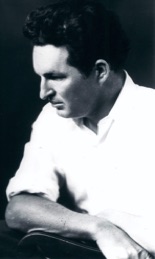Paul Green grew up on a cotton farm in rural Harnett County, North Carolina, learning the value of hard physical labor and the beauty of literature and music. He read books in the fields as he followed a mule-drawn plow. He also taught himself to play the violin. He would later compose music for his own dramas. After graduation from Buies Creek Academy, Green taught school and played semi-professional baseball until he could earn enough money to go the University of North Carolina, but his college education was interrupted by World War I.
Green fought in the trenches of Belgium and France and was forever marked by the trauma. After he returned to the University, he was a key figure in the early days of the Carolina Playmakers. Among his Playmaker friends was author Thomas Wolfe and his future wife, the talented writer Elizabeth Lay.
From childhood, Paul Green's deep convictions about the immorality of racial discrimination, capital punishment and military conflict influenced everything he did and wrote. He received the 1927 Pulitzer Prize for Drama for his Broadway play In Abraham's Bosom--notable at the time for its depiction of white privilege and the plight of African Americans in the South.
In 1937, Green began working with his own distinctive dramatic form, the symphonic drama, which is now considered a particular genre of historical play, usually set on the very site depicted in the action. The production incorporates multiple art forms--music, dance, pantomime, and poetic dialogue.
The first of these productions was The Lost Colony, about Sir Walter Raleigh's doomed settlement on Roanoke Island in what is now North Carolina--a story that had fascinated Green since college. He would write sixteen more plays in the genre for production around the country. It has been said that America has contributed two important dramatic forms--the musical and the symphonic drama. Of the latter, several are still in production around the country, some created by Green's students.
Paul Green's total literary output included not only symphonic dramas, but other plays, essays, books of North Carolina folklore, two novels, and several short story collections. He also wrote film scripts for Hollywood stars of the 1930s--Will Rogers, Bette Davis, Janet Gaynor, and others. One of his Broadway plays, an early precursor of his symphonic drama, was the 1936 anti-war play Johnny Johnson, with music composed by Kurt Weil. It was Weill's first American effort after his arrival in New York from Nazi Germany. In 1941 Green worked with Richard Wright in adapting Wright's celebrated novel Native Son for the Broadway stage.
Green taught philosophy and drama at the University of North Carolina Chapel Hill until 1944, when he retired to devote his time to writing. His awards also include two Guggenheim Fellowships, the National Theatre Conference Award, and nine honorary degrees. He was posthumously inducted into the Theatre Hall of Fame in New York in 1993, and the North Carolina Literary Hall of Fame in 1996.
All his life Green was active in the cultural life of North Carolina, being one of the founders of the North Carolina Symphony and the Institute of Outdoor Theatre, which served the large nationwide community of symphonic dramas that sprang up after the model of Green's original Lost Colony.
Green's relentless battle against the death penalty found its successors in a number of organizations active in this field in North Carolina. He also traveled around the world on behalf of the United Nations Educational, Scientific and Cultural Organization (UNESCO) lecturing about the art of drama and about human rights.
A year after Green's death, his colleagues and family formed the Paul Green Foundation to foster his principles in the areas of creative writing, human rights, and international amity through a variety of grants and awards.
Paul Green's historical significance stems not only from his influence on the art of the drama, which he loved so well and long, but from his influence on the social values of the South during a period when he stood almost alone in preaching the equality of the races, the richness of Southern tradition in literature, and the intrinsic value of every person, even the condemned felon.
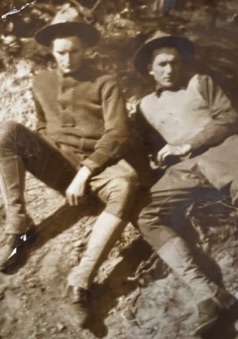
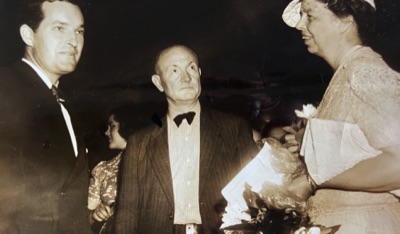
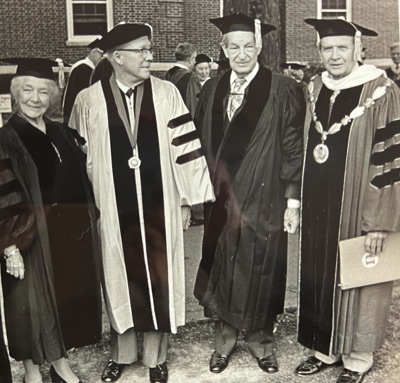
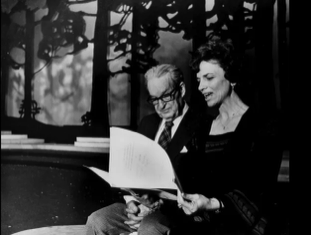
From left, receiving honorary doctorates at Duke University in 1980: "First Lady of American Theatre" Helen Hayes, Milton Eisenhower, and Paul Green with Duke University President Terry Sanford.
Left to right: Paul Green and brother Hugh Green on the battlefield during World War I. Paul Green and First Lady Eleanor Roosevelt (foreground) in Manteo at the first production of The Lost Colony. Paul Green and Cape Fear Regional Theatre founding director Bo Thorp confer over Green's script of The Highland Call--a symphonic drama about Flora Macdonald. (photo courtesy of The Fayetteville Observer)
